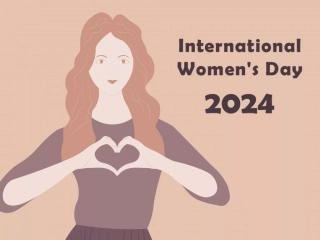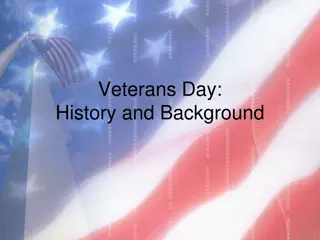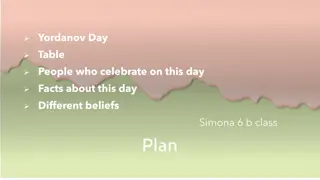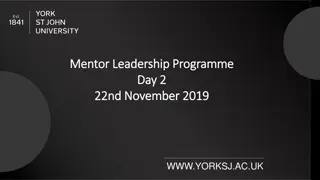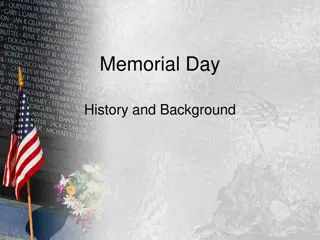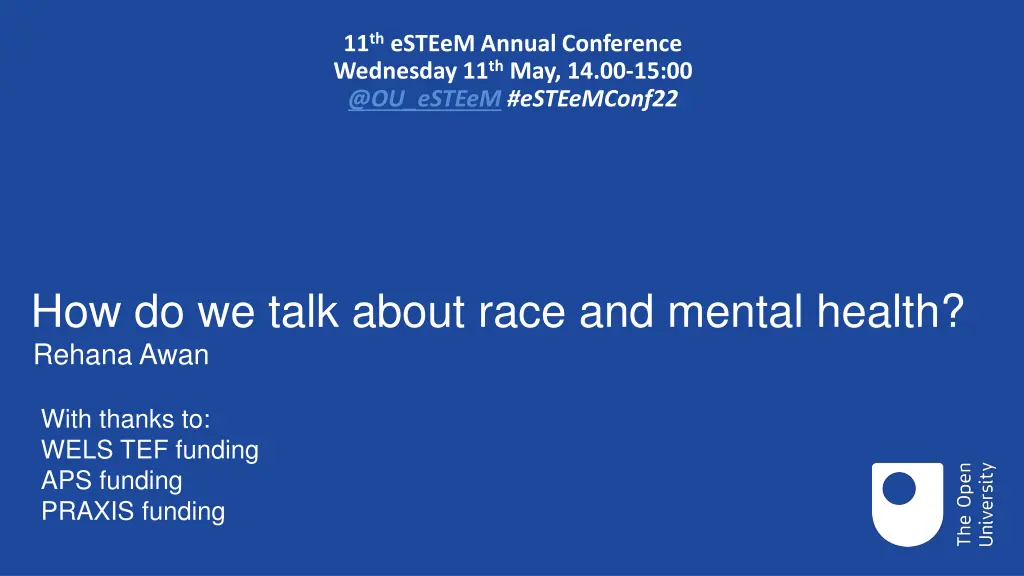
Understanding Intersectional Barriers in Race and Mental Health Discourse
Explore the intersection of race and mental health in academic settings, focusing on the persistent awarding gap between Black and White students. Learn about the importance of cultural competence, representation, and creating a safe environment for discussing race and mental health issues.
Download Presentation

Please find below an Image/Link to download the presentation.
The content on the website is provided AS IS for your information and personal use only. It may not be sold, licensed, or shared on other websites without obtaining consent from the author. If you encounter any issues during the download, it is possible that the publisher has removed the file from their server.
You are allowed to download the files provided on this website for personal or commercial use, subject to the condition that they are used lawfully. All files are the property of their respective owners.
The content on the website is provided AS IS for your information and personal use only. It may not be sold, licensed, or shared on other websites without obtaining consent from the author.
E N D
Presentation Transcript
11theSTEeM Annual Conference Wednesday 11thMay, 14.00-15:00 @OU_eSTEeM #eSTEeMConf22 How do we talk about race and mental health? Rehana Awan With thanks to: WELS TEF funding APS funding PRAXIS funding
Issues and Context A plethora of quantitative data in the sector underlining the persistent awarding gap between Black and White students. OfS stipulation to address the gap as a matter of institutional urgency (see OU APP). Significant sector interest in mental wellbeing particularly resulting from the pandemic. Black students are less likely to declare a mental health condition at the OU. However, little research which brings together the awarding gap for Black and mental health declarations - an example of an intersectional barrier.
Desk research We engaged an experienced researcher to conduct a literature review. The academic literature revealed a gap in the alignment between Black students and mental health. However, 4 key conclusions emerged about the intersectional issues: 1. Need to understand the complex lives of our Black students 2. We must not treat these, or any, students as a homogeneous group; 3. The need for cultural competence; 4. Importance of representation and role models Previous research by members of the team across the OU Access Programme concluded that White people avoid talking about race.
Methodology Following SRPP and ethics guidance an invitation to participate in 121 interviews was sent to all students on Y032, the largest Access module recruiting the highest number of students from disadvantaged backgrounds, asking those who self-identify as Black African or Black Caribbean to respond. Five students were interviewed on MS Teams by 2 Black/Brown interviewers, one an AL on Y032. Each interview was approx. 1 hour in length. The interviews were transcribed (resulting in excess of 100 pages). The data was analysed by the research team who produced a series of themes which were then validated in consultation with the interviewers and participants. The personas: de-personalise individual trauma, semi-generalisable findings represent the breadth and commonalities between participants experiences.
Identity: Black British single mother, Im confident, strong and resilient Age: 27 Name: Kaye First language: English Educational experience I was told I was never going to amount to anything by my teachers at school. They had low expectations for me. I needed the bursary to study. Talking about mental health Disability - None My parent s generation just used to get on with stuff, not seeking help or talking about it. It wasn t right but they didn t want to be labelled mad and then for people to avoid them or they feared their family will find out. There s nothing to be embarrassed about though, you won t be treated differently, need to speak out and not hold things in because that s where the problems happen. Need to tell people it s confidential and make information easy to find. Talking about race I ve experienced direct racism. White people know about where to find out stuff and how to get things done; need to share this with Black people so they know too. Black people are fine talking about race it s White people who aren t comfortable with it. Black people need to be empowered from the bottom and this will make the changes that are needed. Representation I d like to be taught the contributions Black people have made and I want to see myself reflected in the staff, students and curriculum at the OU. The OU should help students build resilience, have student partnerships and get Black students to make videos and tutorials to show other Black students they can do it. My tutor has been amazing though and helped me so much. 5
Identity: Black African (Nigerian) Age: 45 Name: Joshua First language: English/Igbo Talking about mental health I don t post in the forums because I feel anxious and I don t know who the other students are reading it. You have to be strong, you re told you re the pillar or not being a man or you re not strong enough, you re crazy or need to man up. So, I don t talk about it but brush it off. I don t want to be seen as weak. We need to talk to people in the community and tell them about it and that it s ok. I d like to talk to someone who s trained and can offer direct support Representation There were only 2 Black people in my tutorial. Being the only Black man in a White class F2F would play on my mind. I worry that I might be in the wrong place. I tried to find the Black experience in the materials, it s only negative representation. The tokenism on the OU website reinforces structural inequalities. Disability I don t like this question as I don t think I have a disability. Why is mental health and disability put in one category? Talking about race I ve experienced direct racism. White people feel guilty when they talk about racism, so they avoid talking about it let s not go there . We need to find the common goals and the common points to find agreement. Educational experience I studied in Nigeria.I don t like to bother my tutor with issues or when I m not feeling well. I worry about the stereotypes linked to Black people, like they don t want to work, they re lazy . 6
Identity: Black mature and disabled First language: English/Bajan Age: 57 Name: Brenda Educational experience Talking about mental health People talk about mental health but need to. It s one of them things nobody wants to know. Support is there though if you want it, just have to look for it.It s not about lifestyles but is from within. Race isn t relevant as mental health affects everyone in different ways. You need to be willing to do things for yourself, it s the individual s responsibility. Talking about race I ve experienced direct racism, all Black people have, race is a part of you, but it doesn t define me. It s an on-going conversation. It wasn t good, I didn t fit into school life Representation White people don t know what words to use, they re scared but the tension can leave the topic untouched. Things White people say can be taken the wrong way and accusations about racism stop White people from talking about it. I thought more people would be drawn to the OU because there aren t any barriers. Disability I have MS but when I told my SST they were outstanding with their support and help. They printed the forms I needed and sent them to me as I didn t have a printer. 7
First language: English Identity: Black disabled woman Age: 38 Name: Zaahra Talking about mental health I hide when I have bad days, I have a disability that can t be seen and don t really like the way I m labelled disabled. People need to be told it s ok to talk about how they re feeling and that there will be no judgement, we need to teach people how to do this. It s ok not to feel good. A bit of support can keep you studying. My tutor supported me when I needed help and was struggling. They shared links with me, but I d have liked to have spoken to someone rather than just use websites. Representation I don t post to forums or attend online sessions. No one can tell I m Black, but I m not confident as I don t know who else is there. I d like to meet other students who are going through the same thing. It would be good to see more of my history and learn more about what my people have done to build society. Hidden curriculum Registering with the OU was hard, I almost gave up but wanted it badly. I was clicking and clicking but nothing to help me. I had a really long waiting time when I called. I needed to be shown how and where to access support and information. Talking about race White people are worried about talking about race in case it offends, they re caught in the past. People don t know what terminology to use. There s a real pressure being Black in a White country.It s important to talk about race. Although odd when White people try to teach you about your past. They don t feel the pain of slavery. Educational experience Lacks confidence. Used the bursary to study. 8
Identity: Black man not sure where I belong. My family were forced migrants. I came to England from Sudan in 2015 Age: 47 Name: Abdo First language:Arabic/English Talking about mental health I was struggling with my studies, with life in general I was tired all the time and felt unwell. I don t want to be labelled with a mental health condition. I don t want to be called crazy. I was worried about telling the OU because of the impact on my family and studies being labelled with a mental health condition. I also thought they d make me get a letter or certificate from my Dr and that it would cost me money to do. My tutor is amazing though, I ve had fantastic support. I confided in my tutor about how I was feeling and they sent me links to a website, some videos and to the help centre. I wish there was a dedicated wellbeing service that I could pick up the phone and call and speak to someone. Someone who would be able to understand my past and my journey. Educational experience Lacks confidence, used the bursary to study Talking about race White people don t like talking about race because they feel guilty about their colonial past and the problems they created which impact on people who have come to this country. Representation I don t feel isolated but I don t have much contact with other students. I know to go to my tutor if I m struggling. The reflective parts in the module is good but I don t really see myself in the materials but I am having the same experience as other students. I belong because my work is ok. It would be nice to have a Black tutor. Disability I wouldn t call it that 9
Outputs Black and Minority Ethnic students: Mental wellbeing and study support - OpenLearn - Open University Widening Participation and Lifelong Learning, Volume 23, Number 3, 9 December 2021, pp. 147-162(16)
Key recommendations 1. Mental health 2. Staff development 3. Tutor support 4. Empowerment 5. Hidden curriculum 6. Race and racism 7. Student Finance 8. Marcomms
What our Black students are telling us about.. Mental health Our messaging needs to reassurestudents there s nothing to fear or be embarrassed about by talking to us, they won t be treated any differently and that the information is confidential. We need to tell students how they need to speak out to get help and with help they are more likely to keep on with their studies. We need to make it easy for students to find the information they need, through their tutors, in module design and on StudentHome. Building reflective tasks into modules can allow students to think about how they re feeling at certain points in their study and signposts to support can be embedded into materials. Students need to know what declaring means along with the different levels of support and that they don t necessarily need a Drs note/certificate. We need to review the way in which mental health is declared as a disability and consider how we can uncouple these terms. The language used to describe mental wellbeing may be more subtle or different for Black students which means we should listen for cues about feeling unwell, tired, having a bad day, not feeling too good etc.
What our Black students are telling us about.. Staff development Staff should be trained in how to support Black people with mental health conditions, have cultural competence and empathy with the individual s journey. A wellbeing helpline would make it easy for students to have direct contact with someone they can speak to. Teaming up with an existing provider that provides culturally competent support couldalso help. Having empathy when speaking to students can help with recognising the different journeys students have had. Our front line staff need to be able to empathise with a forced migrant and the impact of this on their mental health, as well as with people who experience or have experienced racism, whether direct or indirect, on a regular basis (in addition to issues around intersectionality).
What our Black students are telling us about.. Tutors Tutors are key in the student relationship as they are trusted individuals and are spoken of highly by students. Tutors need to have high expectations for all students, and encourage attendance at online learning events whether synchronous or asynchronous. They OU needs to support students with anxieties about posting in forums and being seen at tutorials by supporting tutors to create a tutor group identity and community so that students can see each other and get to know each other and feel psychologically safe. Tutors should reinforce students expectations about tutor contact and support and be proactive with contact. Signposting students to support is also key. The OU needs to increase the number of Black academics. Empowerment Empowering Black students will enable them to succeed. This may include embedding support into the module design e.g. how to be resilient, where to find the BAME OU Student Association network. Seeing other Black students, staff and themselves reflected positively in the curriculum are all enablers.
What our Black students are telling us about.. Hidden curriculum We can t assume students will know where or how to get the information they need to support them with their studies. Students need on-going guidance and support with finding this out e.g. how to fill in the finance forms or when they should contact their tutor. Mechanisms for induction (a process rather than event) and on-going support should be explored (e.g. study buddies, student partnerships, peer mentors, PLAs, tutor support etc). This will help to build student confidence as well as knowledge about the support mechanisms. Race and racism We need to talk about racism openly, challenge our understanding and speak and learn from those with lived experience. We need to check our own unconsciousbiases, avoid stereotypes and stereotyping and develop cultural competence. This is as much an individualsresponsibilityas it is the OUs . We need a terminology checklist that is shared with staff and students to support people with using appropriate language.
What our Black students are telling us about.. Student finance Bursaries - Black students tend to be from lower socio-economic groups and therefore need to work and study. The cost of a module may be prohibitive. A bursary can support students by absorbing this cost and potentially go towards reducing the hours that a student may need to work to enable them to have more time to study. Marcomms Be open about the awarding gaps at the OU and what this means for our Black students. Review websites to improve meaningful representation include real Black students and their stories.
THANK YOU Rehana.Awan@open.ac.uk


